David Stairs
I thought it was malaria. I had all the symptoms: headache, chills, fatigue, fever, sweats, dry cough. My first three weeks in country I’d been living near a swamp, and the incubation period seemed right. No matter that Bangalore is not in a malarious zone, my son was alarmed. We’d lived in Africa a number of years and never had malaria, but I’ve seen many friends suffer its curse.
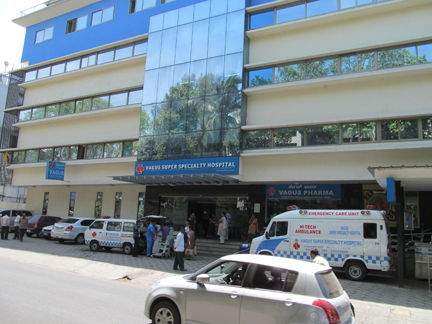
I remember an American friend telling me he’d returned from abroad presenting a spectrum of symptoms, but his American doctors kept him hospitalized for days on end, to the tune of $13,000, unable to reach a diagnosis. Since I live right across the street from a medical facility I decided to seek a local opinion. On my first approach of the Vagus Super Specialty Hospital I was told the general medicine doctor would be in at noon, so I went home for an hour. Upon returning, I was rushed into the “casualty” section because there was supposedly no waiting there. Suddenly surrounded by five pretty nurses and a lovely nurse practitioner, I was invited to recline on a gurney while they collected my vitals. I told them I thought I had malaria, and they ran through the usual barrage of questions about symptoms. “Yes” to all. I requested a blood test, at which they became quite sober. A moment later they pricked my finger, and I thought, “very efficient.” Only I didn’t know the half of it. What they had taken was a glucose intolerance test, officially a G6PD. Now, I’d already had this test before leaving home. Fulbright/Nehru had so insisted upon it that they would have withheld my grant without it. But here was proof that Indian medicine was not only efficient, but knowledgeable enough to make Fulbright/Nehru look foolish.
Now I learned that I was being directed to the resident physician. Office 02 General Medicine was occupied, so my son and I waited twenty minutes for the door to open. As I arose to enter the office, a matronly woman pushed me aside and exclaimed, “I have to go next.” Although I was not feeling great my condition was not acute, and I’m not willing to be accused of cutting a waiting line because of my race. So I sat back down. Thirty minutes later my son looked at me and asked, “What do you suppose is going on in there?” We were about to find out. A moment later the door swung wide and we leapt into the gap and encountered a slender gentleman with thinning grey hair behind a desk that was far too big for his examination room. Dr. Srinivasa Rao, chief physician, shook my hand and began one of the most thorough work-ups I’ve ever had. He retook my blood pressure, my temperature, my weight and vitals, listened for a prolonged period to my lungs, examined my vital organs with his hands, and asked extensive questions about symptoms, time in country, and medical history. When I told him I’d been given a dose-pack of mephloquine hydrochloride by my doctor in America as prophylaxis but hadn’t taken it he said, “Oh, that’s really strong medicine. We never use that except with resistant strains. If you use it commonly the parasite will develop resistance to it.” I knew this was true because I’d had mefloquine in Africa during my first trip there. It made me crazy, paranoic and insomniac.
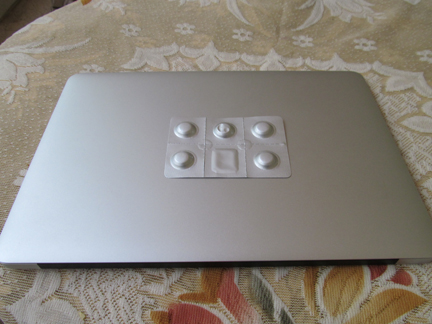
My new MacBook malAiria, with a built-in 5-week dose pack of mefloquine hydrochloride concept: Chris Stairs
At the end of thirty minutes he rendered his “impression.” It was not malaria; malaria presented more acute symptoms. He thought it was “viral fever.” This is, after all, the season change in India. He recommended rest, fluids, acetaminophen for the head and fever, and vit C. He promised to prescribe a blood test for malaria just to be certain, but he was pretty sure I didn’t have it. I was relieved and disappointed. I hadn’t really wanted malaria. While it is eminently curable, it is still sneaky, and can escape eradication only to resurface later. But like all good Americans who felt crappy, I wanted a pill for what ailed me, and acetaminophen didn’t sound like a cure. I visited the phlebotomist, a man with cool hands and the deftest touch with a needle I’ve ever experienced and, after another thirty minutes waiting for the lab, was on my way, malaria negative.
Unfortunately, Dr. Rao’s diagnosis was wrong. Shortly after I returned home from the hospital the diarrhea started and didn’t let up for three days. I’ve had dysentery before, and am pretty sure of a correct personal diagnosis the second time around. I didn’t need the anti-malarial mefloquine. Back home I might be prescribed Cipro, an equally powerful, equally evil antibiotic that will wipe out all your enteric-bacteria, indiscriminately. But the greatest shock of all came when I stopped to settle my bill for the services. Physician’s exam: 200 rupees. Malaria test and lab: 200 rupees. Registration fee: 120 rupees. Drugs: 20 rupees. Total: 540 rupees. Attention of pretty nurses apparently is free.
Dr. Rao’s son is currently studying engineering at U of Wisconsin Madison. When I asked him if he would be able to visit his son he replied, “I can’t seem to find the time.” Since Dr.Rao can’t visit him, I’m sort of hoping his son never has a need to visit an American hospital. I’ve spent time in the American hospital system recently and I’ve gotta say, the most backward place in the world in terms of healthcare ain’t the developing world, it’s the good ol’ we’ve-got-the-right-to-make-a-killing-in-the-name-of-curing-and-we’ll-prescribe-the-strongest-stuff-known-just-because-your-insurance-can-afford-it U S of A.
David Stairs is the founding editor of Design-Altruism-Project

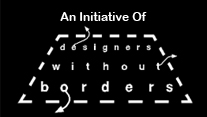




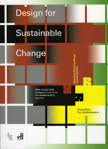
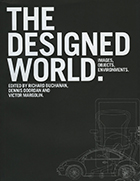
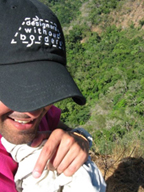


Leave a Reply
You must be logged in to post a comment.